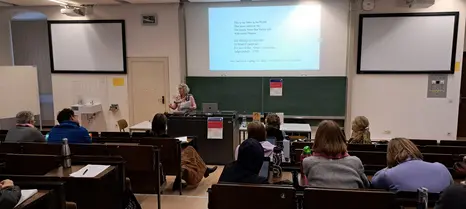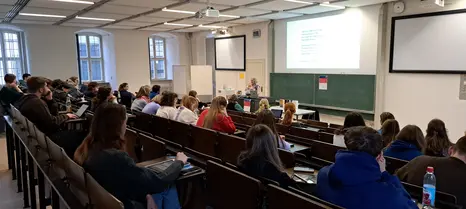Prof. Cristanne Miller (University of Buffalo, SUNY): "'My letter as a bee, goes laden': Communication Strategies and the Speaking Self in Dickinson’s Letters and Poems"
Thursday, November 14, 2024, 2:15-3:45 p.m., U5/00.24
(The room is accessible to wheelchairs and people with reduced mobility.)
When Dickinson writes about letters in poems, she blurs boundaries of genre and speaking positionality. In contrast, in her letters, she writes specifically about the “power” (the “life-warrant or death-warrant”) of letters, not generally of language. Of course, poems can also be powerful, breeding “Malaria” over generations, and the blinding “Truth” that is not told “slant” enough to “dazzle gradually.” But one does not expect that kind of danger or power in personal correspondence. Dickinson’s letters do blur genre boundaries to the extent that they contain metered prose, lines of poems, and sometimes whole poems, that contribute to what she wants to communicate in the letter; to a dozen or more correspondents, Dickinson also circulates poems as letters—that is, containing no prose at all except for an address (“Dear Sir” or “Sue”) or signature.
Letters imply intimacy: communication from one person privately to another. Poems, even if unpublished, have a universal edge: they can be used in different circumstances for different purposes—as Dickinson frequently did, circulating poems in letters to multiple people, even years after composing them. The letter context implies, deceptively, that the poem or lines of a poem were written exclusively for that single correspondent. In this lecture, Prof. Miller will talk about what we learn from Dickinson’s letters that we do not learn from the poems alone, and about the communication strategies she exercises in this blurring of poem/letter boundaries.
Cristanne Miller is SUNY Distinguished Professor and Edward H. Butler Professor of Literature at the University at Buffalo, SUNY. She has published extensively on Dickinson, and on nineteenth- and twentieth-century female poets. Among her books on Dickinson are Emily Dickinson: A Poet’s Grammar (1987) and Reading in Time: Dickinson in the Nineteenth Century (2010). She edited Emily Dickinson’s Poems: As She Preserved Them (2016, winner of the MLA Best Scholarly Edition award) and is completing a new edition (with Domhnall Mitchell) of Dickinson’s complete letters—forthcoming with Harvard University Press, 2024. She has served as president of the Emily Dickinson International Society and of the Modernist Language Association, and she founded and directs the Marianne Moore Digital Archive, which is publishing all 122 of Moore’s working notebooks in facing-page editions online.


